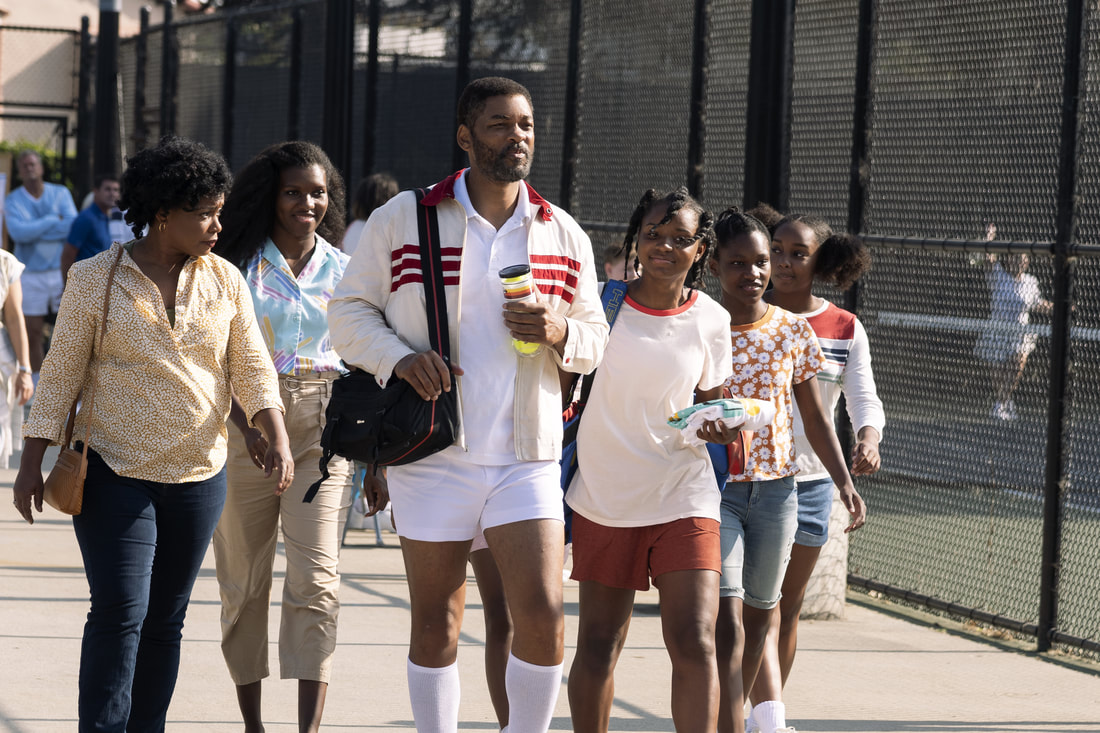King Richard is operating in a place that is methodically setting up anyone who disagrees with Richard to fail, as every viewer knows that his daughters are going to go on to dominate the sport. Therefore, Green and writer Zach Baylin must endeavor to keep their film from turning into The Newsroom. They do this by undermining Richard in the way that his plans are executed, and not the execution itself. He can still be right, but he’s going to be irritating in getting there. Smith plays him as an accommodating guy, or at least with the appearance of accommodation. What’s actually happening is that he’s pushing off decisions that he doesn’t want to make, often by complimenting the proposer and promising that he’ll think about whatever issue they have in mind. The film also takes care to show how much of an act this is, and that Richard is capable of anger and impulsivity but is always working to keep those negative qualities under control. This mirrors his attempt to distill parenting into a planned science, an emotionless path from A to B where training and repetition decides next steps instead of emotion and feeling. It’s the country club dads and the rebellious teen stars who are letting emotion push them off course, and the Williams are going to stick to the plan.
This highly regimented lifestyle could make the king of the title into a tyrant, but Richard and Brandy have put just as much emphasis on emotional development as they have on physical and academic. They’re concerned with humility as much as they are with confidence. In Richard’s imagination, teen tennis stars like Jennifer Capriati are acting out because they lack a base of support. Therefore, based on the general happiness that Venus and Serena and their half-sisters all exhibit, the film is effectively over before it begins. If it’s not a question that the sisters will succeed and that they’ll be able to handle success, then King Richard becomes about whether Richard can acknowledge it and relinquish control. It patches over its fatal flaw with the question of how long Venus and Serena will be spun up before they’re let go. The film doesn’t build tension with whether or not Venus is going to crush her competition. Drama instead comes from how Richard is going to react as she inevitably starts to exert her own will.
A Richard Williams hagiography might be the perfect Father’s Day gift from his producer daughters, and though this is close, it’s not fully resting the halo on his head. The film includes a vital scene where Brandy dresses him down for being too rigid, and raises the specter of the adult children that he’s abandoned, though they never make an onscreen appearance. Other sources of leavening discontent are Brandy’s three daughters, but they only register as cheerleaders. Teen successes in their own right, the film misses an opportunity to question what it would be like to live in a house or to be shuttled around the country for their younger siblings, who also occupy the lion’s share of their parents’ time. More visible in their pushback are Macci and Cohen, both of whom have to convince Richard that Venus and Serena are more then just line items on their schedules. His skepticism is well-founded, as they have many irons in the fire while he just has the two. Macci succeeds where Cohen fails because of differences in their pay structure, where the latter was paid up front but the former only gets paid when Venus starts winning. Bernthal ably demonstrates the irritation of working for free for years, knowing that the savvy Richard can always walk away if he gets pushed too hard. The film has sympathy for Macci and judges Richard to be a frustrating partner, while also admiring Richard for stringing a powerful white man along.
In the lead, Smith is doing his Pursuit of Happyness schtick, though this time, he’s not evoking paternal love opposite his actual young child. His penchant for clenching his jaw during emotional moments and letting the tears flow as he chokes out how important x or y is to him is brought back here, and that particular tool is used rarely enough that it remains powerful. Affecting an accent and short shorts, his Richard paces and frets during matches, almost telepathically in Venus’ head as she plays her game. Ellis elevates a stock role by bringing resistance to her supportive wife, while Sydney and Singleton alternately bring effervescence and intensity to Venus and Serena. Sydney especially shines bright as Venus debuts her trademark beaded hairstyle. Meanwhile, Green’s direction is most apparent in the tennis scenes, where he finds the precision within the game. His camera accentuates straight lines and detailed movement to produce the perfect serve, an evocative combination of grace and power made all the more impressive by the children who’ve figured this out at such a young age.
Sports dads don’t need more encouragement to push their kids to travel teams and endless summer camps, but between Richard Williams and Earl Woods, they’ve found a pair of patron saints to remind them of what’s possible. Sorry, children of America. King Richard ends in a state of mystification, that all Richard’s monomania didn’t end in miserable daughters who hate their father, that Richard and Brandy could raise their kids in this way and be successful when so many cultural indicators point towards something worse. A film that backgrounds Venus and Serena Williams, at any age, needed to at least answer that question. King Richard puts it on the general affability of the two girls, blessed with athletic talent and the focus to capitalize on it and also with charisma and kindness. Maybe this avoided being a hagiography of Richard Williams by being one for Venus and Serena instead. B-

 RSS Feed
RSS Feed